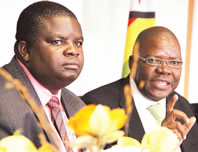Gaddafi’s troops seize strategic Libyan town
rebels to retreat under a heavy bombardment while world powers considered imposing a no-fly zone.
Losing Brega and its refinery further limits rebel access to fuel after the insurgents were pushed out of Ras Lanuf yesterday, another major oil terminal some 100km to the west along the coast road where all of Libya’s important towns are located.
“Brega has been cleansed of armed gangs,” a Libyan government army source told state television.
“There’s no uprising any more,” said rebel Nabeel Tijouri, whose heavy-machinegun had been destroyed in the fighting. “The other day we were in Ras Lanuf, then Brega, the day after tomorrow they will be in Benghazi.”
Brega is 220 km south of the rebel stronghold of Benghazi with the town of Ajdabiyah the only sizeable town standing in the way. From Ajdabiyah there are roads to either Benghazi or Tobruk, close to the border with Egypt.
Libya’s flat desert terrain means the government’s air supremacy and big advantage in tanks outweighs the rebels’ enthusiasm and light weaponry. Only towns and cities provide some cover for the insurgents and partially even the odds.
“He’s out of Brega. He’s on the way, maybe in half an hour his rockets will reach us here,”rebel fighter, Masoud Bwisir, at the western gate of Ajdabiyah, said.
The speed of the government advance may overtake drawn-out diplomatic wrangling on whether or how to impose a no-fly zone.
The United States said a call by the Arab League for a UN no-fly zone protect Libyan cities was an “important step”. But while Washington said it was preparing for “all contingencies”, it remains cautious over endorsing direct military intervention.
Arab League Secretary General Amr Moussa said the League had “officially asked the UN Security Council to impose a no-fly zone against any military action against the Libyan people”.
France, one of the vocal supporters of a no-fly zone, welcomed the call by the Arab League which it said demonstrated the willingness of the international community to protect Libya’s civilian population.
France plans to step up its efforts in the coming hours in consultation with the European Union, the Arab League, the UN Security Council and the Libyan National Council, the Foreign Affairs ministry said in a statement yesterday.
Arab support satisfies one of three conditions NATO agreed on Friday are needed for it to take on the task of policing Libyan air space. The others are proof that its help is needed, and a UN Security Council resolution. – Reuters.











Comments